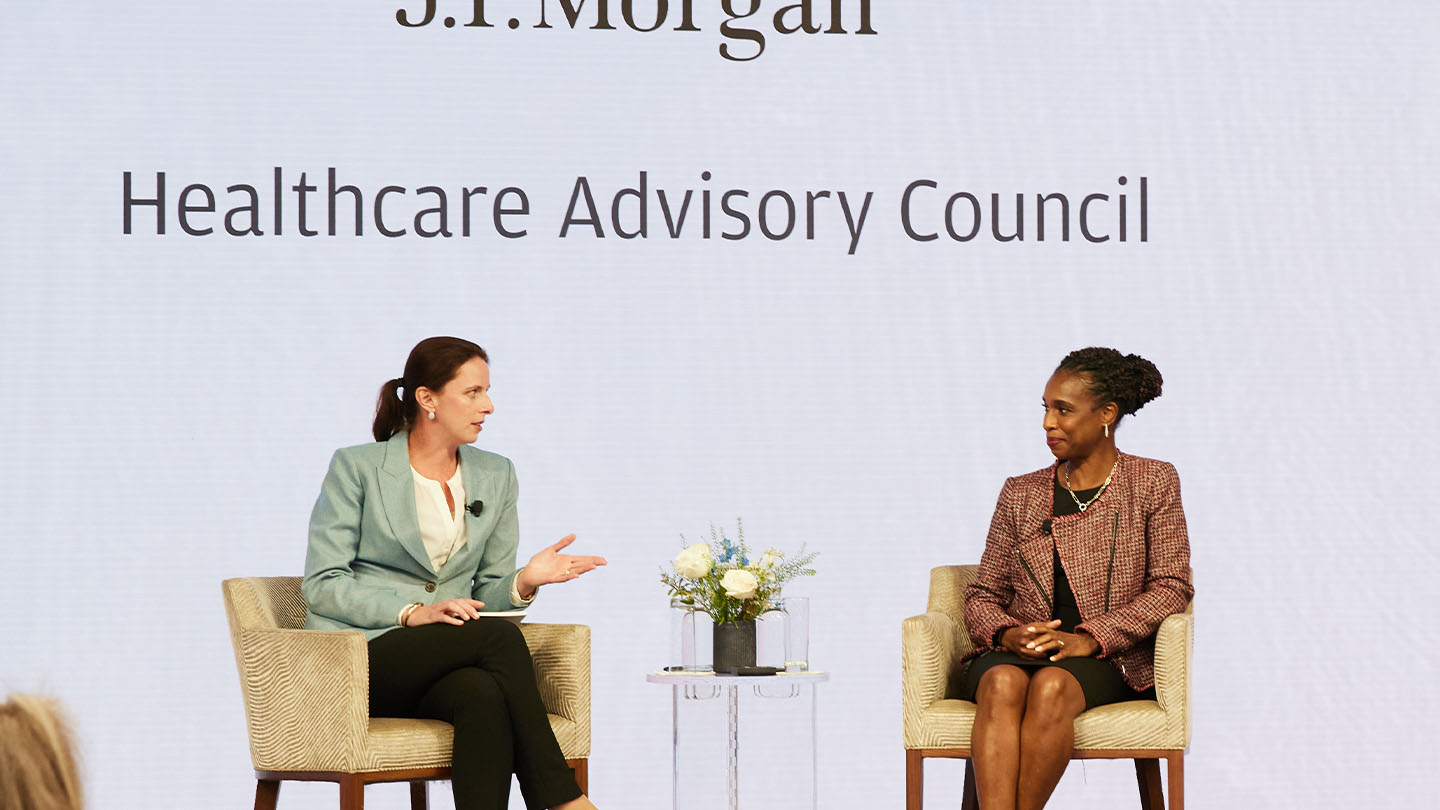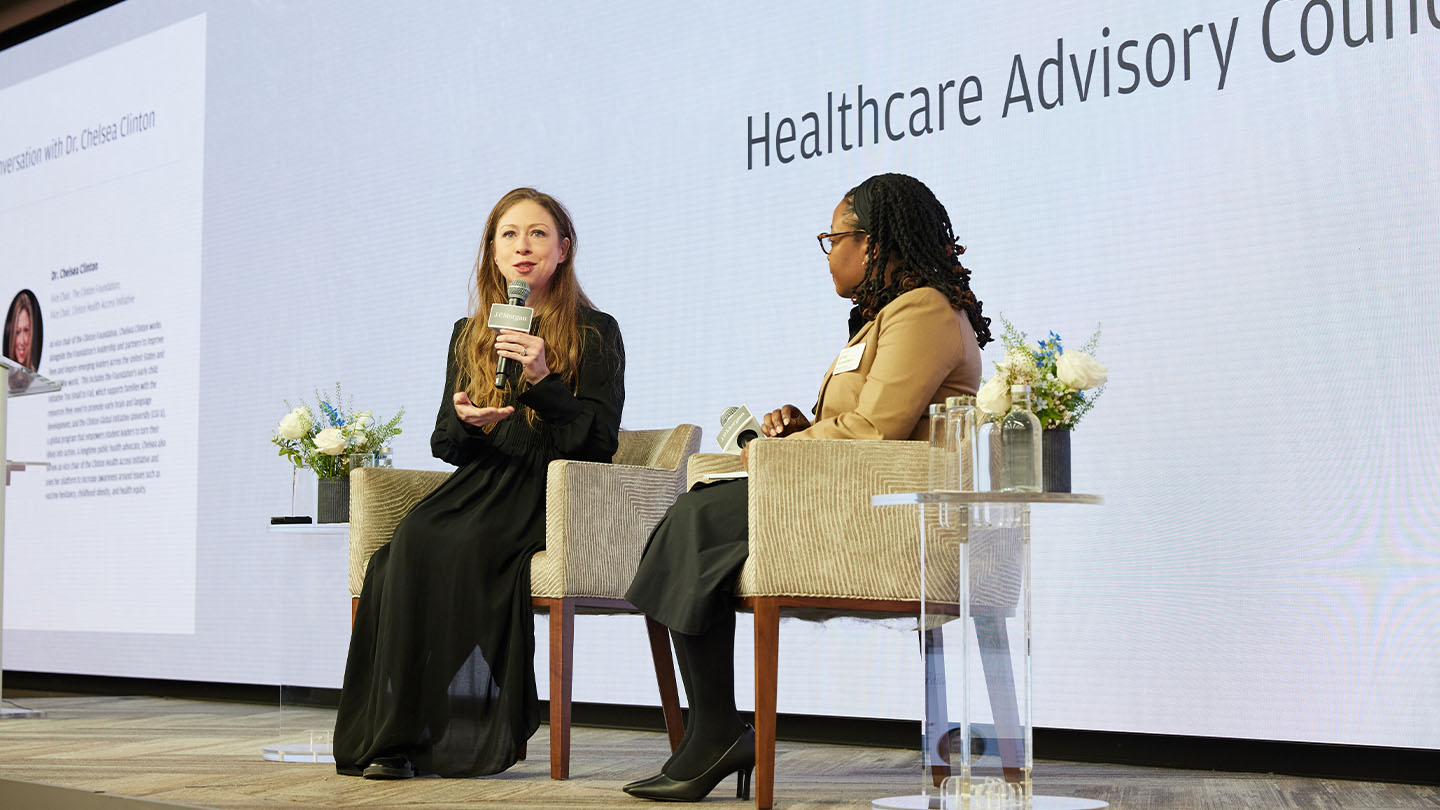
Healthcare organizations face pressures from labor shortages, cyberattacks, regulatory complexities and public health crises. However, industry leaders are meeting these challenges by incorporating new technologies and strategies to better serve patients and communities.
Healthcare leaders from across the U.S. convened at J.P. Morgan’s 12th annual Healthcare Advisory Council (HCAC) event in New York, where they explored the challenges and trends facing the industry. Here are some of the key takeaways from our panelists’ conversations.
AI is improving clinician efficiency and breaking into new use cases
Healthcare has long used artificial intelligence to analyze massive troves of data, such as identifying drug-to-drug interactions. Recent AI advancements have expanded effectiveness into new areas, such as:
- Ambient documentation: Charting and thousands of clinical notes consume enormous amounts of clinicians’ time and attention. Some electronic medical record (EMR) systems are using AI to record patient encounters and compose transcripts and notes.
- Message composition: As more patient care moves online, AI is assisting clinicians by crafting responses through EMR communication systems, reducing cognitive load.
The panelists encouraged leaders to think about implementing AI into their strategy by first defining specific use cases, then applying the appropriate solution for each, rather than attempting a one-size-fits-all approach.
“With generative AI, it’s important to have a human in the loop,” said Peter Durlach, CVP, Chief Strategy Officer at Microsoft Health & Life Sciences. “Having human oversight helps improve the accuracy and quality of AI outputs, which is critical in an industry like healthcare.”
Before implementing AI, healthcare systems and potential users should consider balancing short-term and long-term needs, and the risk and governance involved with each use case.
Thinking of cybersecurity in terms of tech resiliency
Healthcare systems store vast amounts of sensitive private data, making them prime targets for cyberattacks. The February 2024 data breach at Change Healthcare exemplifies this risk.
"Basically, it’s not if a cyberattack will occur against a healthcare organization, it’s when a cyberattack will occur," said Max Alexander, Vice President of Cyber and Technology Emerging Threats Research at JPMorganChase.
While prevention is important, resilience should be a top priority. Organizations must ensure they can recover from cyberattacks by focusing on tech resiliency, having a business continuity plan and practicing it regularly.
Although AI technologies have been improving a variety of aspects of healthcare, they’re also changing the cyberattack threat landscape. Some examples include:
- Phishing emails are written more convincingly than before since adversaries can run them through large language model (LLM) tools like ChatGPT to improve spelling, grammar and appearance.
- Deepfake technology is generating believable images, videos and audio that aren’t real, including simulations of actual people using their appearances and voices.
Healthcare leaders emphasized that a lot of fraud can be prevented with multifactor authentication.
Certain healthcare sectors are ripe for disruption—or evolution
From online pharmacies to home-based care, industry leaders spoke about areas that can be improved by addressing health equity concerns and by designing systems around patients’ needs and goals.
“The retail pharmacy experience is completely broken. It’s not patient-centered,” said Alicia Boler Davis, CEO of Alto Pharmacy. “The pharmacy industry is ripe for disruption.”

Chelsea Clinton, Ph.D., Vice Chair of the Clinton Foundation and Vice Chair of the Clinton Health Access Initiative, at left, was a featured speaker on a panel moderated by Orriel Richardson, Head of Policy & Advocacy at Morgan Health, a J.P. Morgan company.
Chelsea Clinton, Ph.D., Vice Chair of the Clinton Foundation and Vice Chair of the Clinton Health Access Initiative, also spoke about public health crises like rising infant and maternal mortality rates, especially in New York City where she said Black women are nine times more likely to die in birth or the days after birth compared to white women of a similar age, health and ZIP code.
“Health equity is a verb, and we are actively pushing toward health equity,” said Orriel Richardson, Head of Policy & Advocacy at Morgan Health, a J.P. Morgan company.
Leaders and founders in healthcare are addressing access to quality care and patient experience by:
- Bringing technologies in the hospital to the home setting to allow people to receive cost-effective, quality care in the comfort of their own living space.
- Emphasizing holistic and longitudinal women’s healthcare that uses a collaborative, relationship-based care model to help women access care more easily.
- Creating online pharmacy models that are easier to use for prescribers and patients, including elderly and underserved communities.
We’re here to help
J.P. Morgan has years of experience in the healthcare sector, and we can help you navigate the shifting business landscape. Contact one of our bankers to learn more.
JPMorgan Chase Bank, N.A. Member FDIC. Visit jpmorgan.com/commercial-banking/legal-disclaimer for disclosures and disclaimers related to this content.







